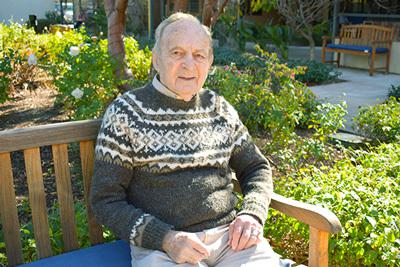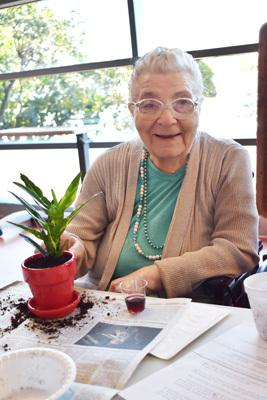The Los Angeles Jewish Home Honors Survivors on Holocaust Remembrance Day


The Los Angeles Jewish Home Honors Survivors on Holocaust Remembrance Day
Yom HaShoah, or Holocaust Remembrance Day, which took place on Thursday, April 8th, is an occasion for solemn contemplation. To reflect on the horrors of the campaign to kill millions of Jews and others is to acknowledge mankind’s ability to do evil. And yet, says Holocaust survivor and Los Angeles Jewish Home resident Joseph Neustadt, it is also a time for hope.

"When we talk about our memories of the war, we make sure that, when we die, the stories will stay alive—and that means we can stop the same thing from happening again" he says.
Born in Latvia, Joseph, who is 93, still remembers his experience vividly. "In 1941, the Nazis killed most of the women and children in Riga (the Latvian capital); that’s when they took my mother and my sisters. But there was a small ghetto for working men, and I joined my father and my brother there. I was about 13 years old," he says. "Two years later, they liquidated the ghetto and sent us to Stutthof, a concentration camp in Germany."
While they were in the camp, Joseph, his brother, and his dad noticed the Nazis would often look over the Jewish prisoners, sending some to the left and others to the right. During one such review, Joseph’s father was sent to the left—and Joseph never saw him again.
As time dragged on, Joseph was shuttled off to various camps until his liberation in 1945—coincidentally, from a camp located in a town with the same name as his: Neustadt. "My brother died 13 days after the liberation, from typhus," he recalls. "That left me as the only survivor in my family."
Joseph’s journey took him from Germany, to Holland, to Canada, and eventually to Los Angeles. He settled in West Hills, where he raised a family with his wife, Arlene, and worked for 30 years as an electrician at McDonnell Douglas.
Today, Joseph, who is twice widowed, is happily settled in at the Jewish Home, where he has lived for the past four years. When he arrived at the Home, he found himself in the company of other survivors like fellow resident, 93 year-old Joshua Kaufman.
Like Joseph, Joshua readily shares his story with all who will listen. A survivor of five concentration camps, including Auschwitz and Dachau, he often thinks back to what his fellow inmates would say to each other during their internment: "If you survive, don't let people forget what the Nazis did." Joshua has stayed true to his word.
When he talks about his past, Joshua is instantly transported back to the day he was liberated in 1945. "I was at Dachau when General Eisenhower came. I saw him from 10 feet away. He was crying as he surveyed the camp, saying, 'If I hadn't seen all the skeletons, I would never have believed something like this could happen,'" Joshua remembers.
From captivity in Germany, he went to Israel, eventually joining the Israeli army. His military career included deployment to the Suez Canal as well as service in the Six-Day War and 1973 Yom Kippur War. Later, in 1975, he took a trip to California with a friend and met the woman who would become his wife.
"Margaret was so beautiful," Joshua says. "We fell in love after three days, and got married in two weeks, and I decided to stay in California."
The couple are now both Jewish Home residents (Margaret for the past nine years; Joshua moved in this year), and Joshua continues to speak the truth of what he lived through in Europe all those years ago. "I believe in educating people—trying to raise this new generation and helping them understand what happened," he says.
Education is also critically important to Frieda Thompson, another survivor who lives at the Jewish Home. For her, learning is a way to overcome the tragedy of the Holocaust and deny the Nazis the victory they sought.

"Even after the Gestapo came and took my father to Buchenwald, my mother—who stayed with us—was very interested that my brothers still go to school," Frieda says. "When my older brother turned 14, my mother said, 'I want him to be bar mitzvahed before the Nazis take us,' and she made arrangements with the synagogue and the rabbi to have the ceremony. It says how much it meant to her that he become a bar mitzvah even during this time."
To keep her parents' memory alive—and in defiance of the Nazi's Final Solution—Frieda decided to become a Bat Mitzvah herself at the Jewish Home. She is currently studying, preparing, and training for her upcoming Bat Mitzvah. "When I was young, women couldn't do it, but now I think it's a wonderful thing," she says.
The Jewish Home honors and salutes Frieda, Joshua, and Joseph—and every Holocaust survivor here at the Home and beyond—for their incredible perseverance and for helping all of us make Yom HaShoah a day never to be forgotten.